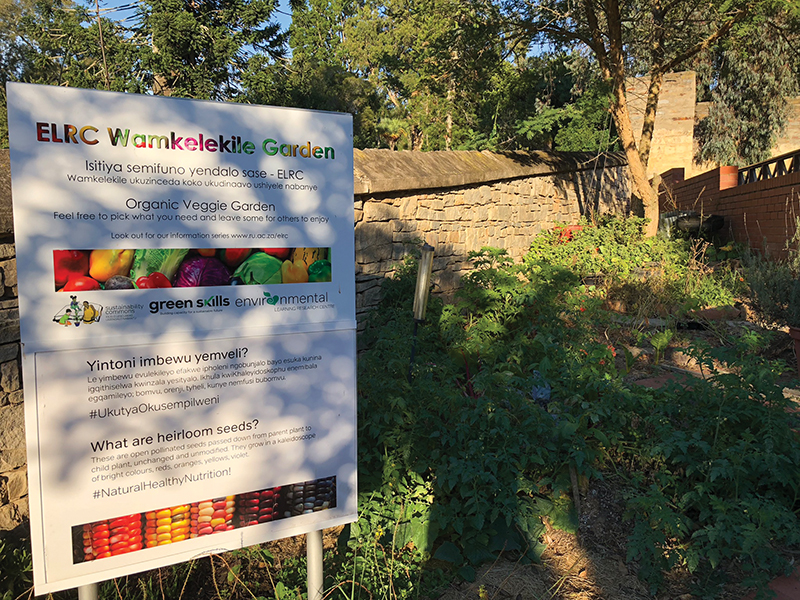The Wamkelekile Garden at Rhodes University may be small, but it got a big purpose.
By Carey Finn
If you’ve been to the Environmental Learning Research Centre (ELRC) at Rhodes, you may have spied a tiny garden full of food and life. Squeezed into and around the edges of a red-brick courtyard, the Wamkelekile Garden stands out as a symbol of sustainability and connection.
The garden is part of the ELRC’s “Sustainability Commons”, a collection of practical projects that engage diverse groups of people to innovate and learn together about sustainable living. It has been cultivated by staff and students in the ELRC over the past 14 months.
Adapted and expanded from a garden tended by former ELRC Director Prof. Rob Donoghue, the Wamkelekile Garden is an experiment that aims to inspire a sense of possibility.
“We’re trying to grow food, but only on a very small scale,” explains Dr Lausanne Olvitt, who leads the gardening project with PhD student, Tichaona Pesanayi. “The main thing is about learning and sharing knowledge with others.
“The garden works with the concept of food and heritage. We’re trying to demonstrate that it’s possible to be self-sustaining, that if you have the know-how, you can save seeds, swop them with other people, and have the independence to grow your own food without spending lots of money.”
This is what Olvitt and her colleagues have done with the mealies, chillies, kale, beans and other vegetables they grow, almost all sprouted from heirloom seeds.
“With this space, we also hope to offer a simple way for students to feel more connected, both to food and to their homes,” adds Olvitt. The garden features vegetables popularly grown in other African countries, such as kale, spinach and dry beans.
Anyone is welcome to pop by and have a look at the Wamkelekile Garden, says Olvitt. It’s an easy detour as one heads to the Botanical Gardens via the gate from the university’s St Peter’s grounds.
“The ultimate aim is to inspire students and everyone else to try and grow things on their own,” says Olvitt. “We hope that the garden will help them see that it can be done, even in pot plants outside one’s room.
“We’re not trying to position ourselves as gardening experts, because we aren’t! We just want to help people understand the possibilities, and also the challenges, of growing food organically.”
Those who want to test their green fingers with a tiny garden could try green peppers or chili plants, as both work well in pots, suggests Olvitt. Kale, spinach, beetroot, beans, tomatoes and herbs for cooking are also good options.



